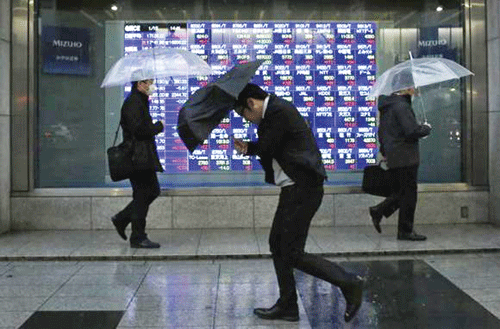
TOKYO — Asian share markets and the euro retreated yesterday as talks between Greece and eurozone Finance ministers broke down after Athens rejected a proposal to request a six-month extension of its international bailout programme.
United States stock futures fell 0,5% in Asian trade while Japan’s Nikkei share average shed 0,3%. MSCI’s broadest index of Asia-Pacific shares outside Japan dipped 0,2%. The euro slipped to $1,1332, about 1c below Monday’s high of $1,14295, though it kept some distance from last week’s low of $1,1270 and its 11-year trough of $1,1098 hit on January 26.
Dutch Finance minister Jeroen Dijsselbloem, who chaired the eurozone’s Finance minister meeting, effectively gave Athens an ultimatum, telling Greece it had until Friday to request an extension or the bailout would expire at the end of the month.

Without support from creditors, the Greek government and banks would face a looming euro cash crunch, possibly opening the way for Greece to become the first country to ditch the common currency altogether and reintroduce its own currency.
“All up, still no deal. And something of a disappointment after what seemed to be the makings of a spirit of compromise last week,” National Australia Bank senior economist David de Garis said in Sydney.
Gold extended gains into a fourth day as concern about Greece supported demand for safe-haven assets. Gold rose to $1 233,60/ounce, rising further from a one-month low of $1 2118 hit last Wednesday.
The yen ticked up to ¥118,34 to the dollar, extending its gain from one-month low of ¥120,48 hit last week. Still, markets generally assume a compromise would eventually be reached given the potentially painful consequence of a Greek exit from the euro.
“The market had been a bit optimistic about an agreement so it was a bit of a surprise,” Société Générale director of forex Kyosuke Suzuki said.
- Chamisa under fire over US$120K donation
- Mavhunga puts DeMbare into Chibuku quarterfinals
- Pension funds bet on Cabora Bassa oilfields
- Councils defy govt fire tender directive
Keep Reading
“But from the past experience during the eurozone debt crisis, the market is accustomed to negotiations dragging on until the very last minute. So while the tail risk appears to be rising, there is no panic in the market,” he added.
Indeed, global shares had hit their highest levels since September on optimism over the Greek debt talks on Monday, with the MSCI all-country world stocks index touching its highest since September 22.
US financial markets were closed on Monday for a public holiday.
Elsewhere, oil prices held firm near recent peaks on supply concern in Libya and Kurdistan.
Brent crude futures stood at $61,74 a barrel, having hit an eight-week high of $62,57 on Monday, gaining 38,5% from a six-year low hit in January.
Egypt bombed Islamic State targets inside Libya after the group released a video appearing to show killing of 21 Egyptians.
A deal aimed at resolving a dispute between Baghdad and Kurdish regional authorities over crude oil exports looked fragile, with the semi-autonomous region’s prime minister threatening to withhold exports.
— Reuters










